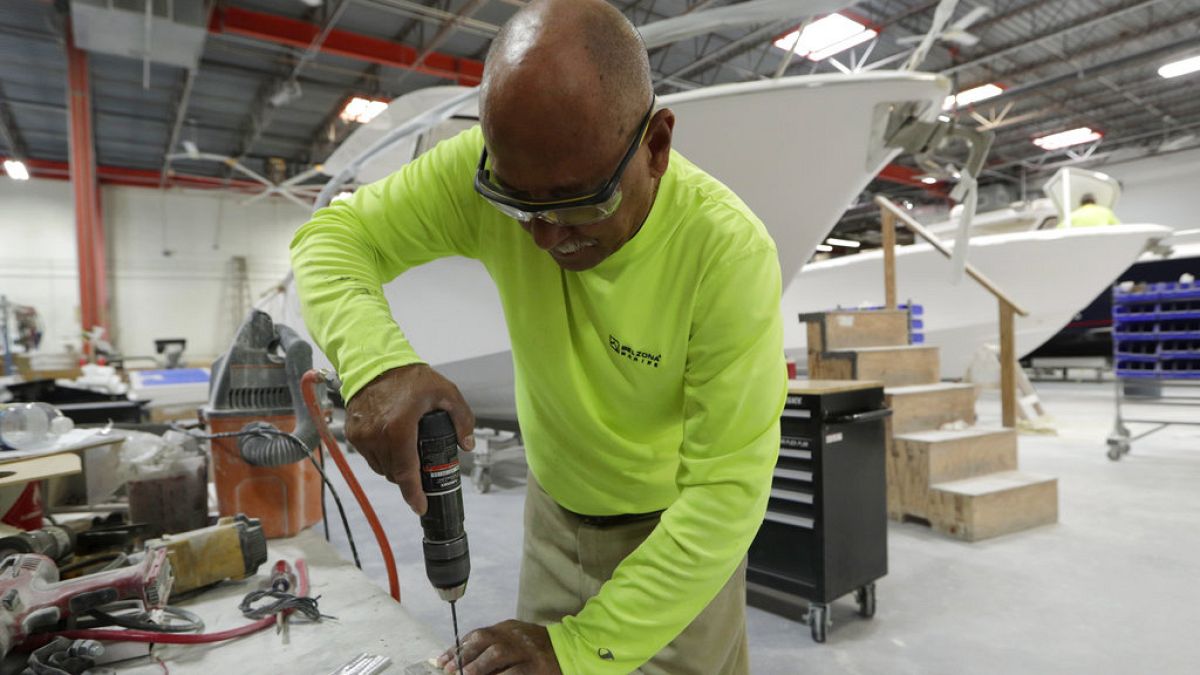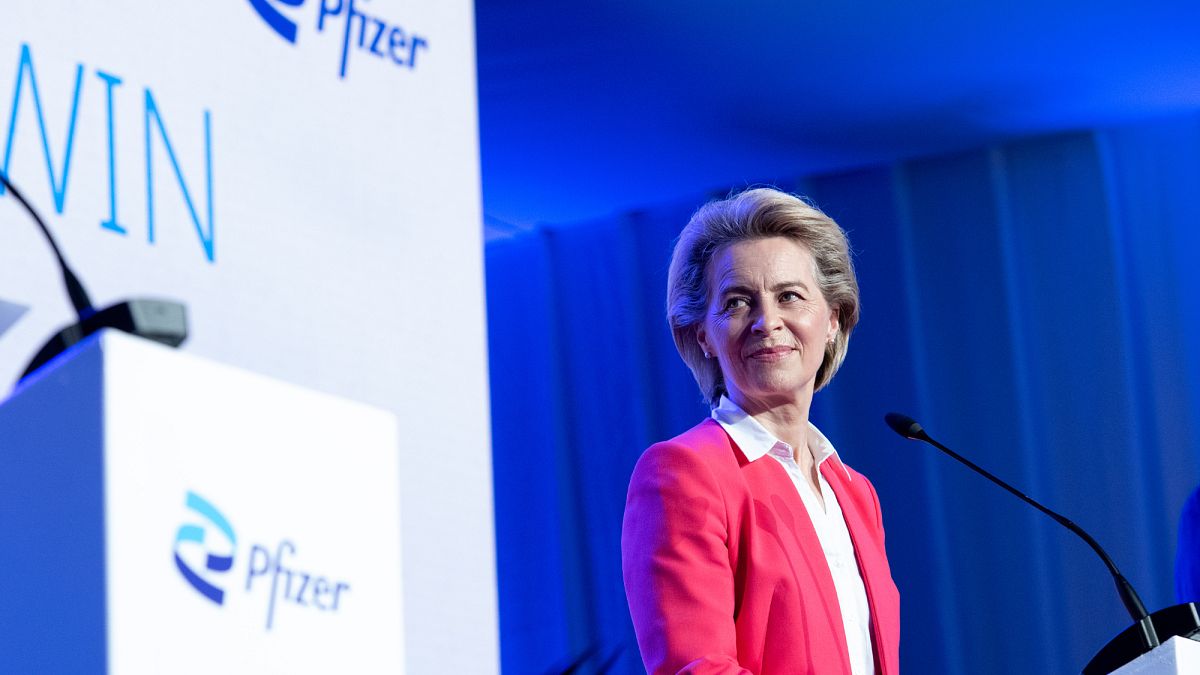Apple is on track to be the first company to be valued at $4 trillion. But the future was not always so bright for the firm.
It’s been a busy week for tech titan Apple, which reported on Thursday its overall sales rose six per cent in the fourth quarter and regained its throne as the world’s most valuable company after Nvidia briefly snatched it last week.
Apple is on track to possibly becoming the first company to have a $4 trillion (€3.6 trillion) valuation. Part of its secret sauce has been in how it has positioned its products.
Instead of inventing tech, such as personal computers or smartphones, the company produced some of the first well-designed versions that were easy to use and worked.
Euronews Next looks at Apple’s history and growth since its launch as well as its influential gadgets and software, and what is next for the company.
The history of Apple
In 1976, Steve Jobs and Steve Wozniak founded Apple. There was a third founder, Ronald Wayne, but he sold his ownership to Jobs and Wozniak.
The first product was the Apple I microcomputer, which was built in Jobs’ garage. It did not have a keyboard or monitor.
A year later, in 1977, the Apple II was released, and the company saw its first major success as it led Apple to become the leading computer manufacturer in America and one of the largest IPOs of its time.
But Apple’s success came crashing down after Jobs spent too much of the company’s time and money on the Apple Lisa. But the pricey desktop computer was unsuccessful after its launch in 1983.
Jobs then moved on to the Macintosh computer, which was a challenge to IBM, the market leader at the time. The advert for the Macintosh was unveiled at the 1984 Super Bowl and showed a rebellion against a dystopian world of conformity, supposedly representing the fight for the control of computer technology as a struggle of the few against the many.
However, a conflict between Jobs and Apple CEO John Sculley over the Lisa and Macintosh not living up to sales expectations saw Jobs stripped of all duties by the board of directors.
Jobs subsequently left and started a new company, NeXT Computers. His co-founder Wozniak also left Apple due to personal reasons.
Apple was doing well until the mid-1990s but then it almost went bankrupt after facing competition from Microsoft’s cheaper PCs and product releases that flopped, such as the Newton tablet.
Apple then bought Jobs’ new company NeXT and named Jobs as interim CEO after the former CEO was ousted. Jobs then refocused Apple on its computer business and saved it from bankruptcy.
“People rarely think of it now, but when Steve Jobs came back to Apple in 1997 it was in a perilous position - at that point, it had just lost $50 million (€46 million) in a single quarter. Ever since, it has made a number of bets that have pretty much all paid off,” Tim Danton, editor-in-chief of PC Pro and author of The Computers That Made Britain, told Euronews Next.
A year later, in 1998, the iMac was shown off and a few years later, the Mac OS X operating system was released. The same year, in 2001, Apple released its first iPod, establishing the company’s reputation as a tech trendsetter.
Apple’s secret is “down to one word: design,” said Danton.
“Apple is never the first at bringing technology to the market, but when it does, it makes sure it looks damn good and that it works flawlessly. Take the iPod. MP3 players had been around for a few years, but Apple created a desirable version that was easy for non-techies to use,” he added.
The years that followed saw the iPhone release in 2007 and the App Store and iPad in 2010.
In 2011, Jobs took a leave of absence and named Tim Cook as Apple’s CEO. Jobs died later that year of pancreatic cancer.
The Tim Cook era
Since Cook’s takeover, Apple has adapted and expanded its services to include its media streaming service Apple TV+ and Apple Music and a mixed-reality headset that combines augmented reality (AR) and virtual reality (VR), the Apple Vision Pro.
Apple has also entered the artificial intelligence (AI) race with an upgrade to the iOS 18 operating system and four iPhone 16 models that have a special computer chip needed to power the AI features.
While companies such as Samsung and Google rushed out their AI technology, Apple took a bit longer, which it can afford to do.
“In part, Apple can take a wait-and-see approach to ensure it offers users a better experience which is paramount,” said technology analyst Paolo Pescatore.
“Arguably with this in mind, it doesn’t necessarily need to be the first or keep pace. However, it cannot rest on its laurels and needs to consider a strong roadmap that goes beyond incremental upgrades for its vast breadth of portfolio,” he told Euronews Next.
Such devices Apple could introduce in the future include foldables, connected/smart glasses as well as a smart ring to name but a few, Pescatore said.
“As we move towards a software-driven AI-powered future, everyone will be seeking to dethrone the king of the hill,” he added.
Can Apple keep the pace?
Cook has been able to successfully navigate the current challenges such as geo-political tensions between the US and China and demand from its Chinese market slowing.
But Apple has had another issue with European regulators as the Digital Markets Act (DMA) has meant that European users of Apple’s devices can download software from outside the App Store.
Apple’s Vision Pro glasses have also been somewhat of a flop, as they are expensive products and are heavy to wear for long periods of time.
But experts are upbeat about Apple’s long-term future.
“I’m much more confident about Apple’s future than any other tech company because it’s so brilliant at locking people into its ecosystem,” said Danton.
“Although there are plenty of Apple knockers, overall people love the brand. Even the haters grudgingly respect Apple,” he added.
That’s partly because its business model isn’t based on things people hate, like advertising and invasion of privacy, Danton explained.
“It means Apple can say that it’s the brand that cares about privacy, which could become even more important in the next decade,” he added.
Despite some tech not paying off, most recently the Vision Pro, which has slower than expected sales, Danton said the company “isn’t afraid to play the long game” and “plan years ahead”.
“[Apple] probably has a much better idea of what the future holds than futurists - after all, it will be the one helping to shape the future,” he added.

 5 months ago
42
5 months ago
42






 We deliver critical software at unparalleled value and speed to help your business thrive
We deliver critical software at unparalleled value and speed to help your business thrive






 English (US) ·
English (US) ·